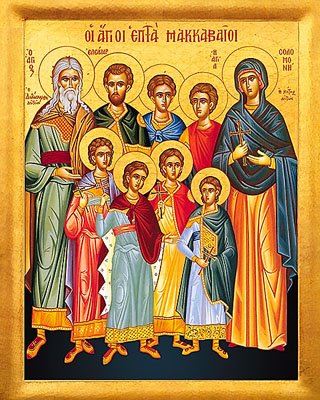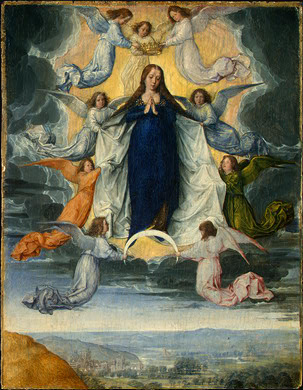
(The following is excerpted from Dom Prosper Guéranger's entry in The Liturgical Year for 26 July in Volume XIII of the 1983 Marian House edition of the English translation by the Benedictines of Stanbrook.)
"While the Church on earth inaugurates these days by adorning herself with Peter's chains [August 1 is also the
Feast of St. Peter's Chains] as with a precious jewel, a constellation of seven stars appears for the third time in the heavens. The seven brothers Machabees preceded the sons of [St.] Symphorosa and Felicitas in the bloodstained arena; they followed divine Wisdom even before she had manifested her beauty in the flesh. The sacred cause of which they were the champions, their strength of soul under the tortures, their sublime answers to the executioners were so evidently the type reproduced by the later martyrs, that the Fathers of the first centuries with one accord claimed for the Christian Church these heroes of the synagogue, who could have gained such courage from no other source than their faith in the Christ to come. For this reason they alone of all the holy persons of the ancient covenant have found a place on the Christian cycle; all the martyrologies and calendars of East and West attest the universality of their cultus, while its antiquity is such as to rival that of St. Peter's chains in that
same basilica of Eudoxia where their precious relics lie."
"At the time when in the hope of a better resurrection they refused under cruel torments to redeem their lives, other heroes of the same blood, inspired by the same faith, flew to arms and delivered their country from a terrible crisis. Several children of Israel, forgetting the traditions of their nation, had wished it to follow the customs of strange peoples; and the Lord, in punishment, had allowed Judea to feel the whole weight of a profane rule to which it had guiltily submitted. But when King Antiochus, taking advantage of the treason of a few and the carelessness of the majority, endeavoured by his ordinances to blot out the divine law which alone gives power to man over man, Israel, suddenly awakened, met the tyrant with the double opposition of revolt and martyrdom. Judas Machabeus in immortal battles reclaim for God the land of his inheritance, while by the virtue of their generous confession, the seven brothers also, his rivals in glory,
recovered, as the Scripture says,
the law out of the hands of the nations, and out of the hands of the kings [1 Mach. ii. 48]. Soon afterwards, craving mercy under the hand of God and not finding it, Antiochus died, devoured by worms, just as later on were to die the first and last persecutors of the Christians, Herod Agrippa and Galerius Maximian."
"The Holy Ghost, who would Himself hand down to posterity the acts of the protomartyr of the New Law, did the same with regard to the passion of [St.] Stephen's glorious predecessors in the ages of expectation. Indeed, it was [H]e who then, as under the law of love, inspired with both words and courage these valiant brothers, and their still more admirable mother, who, seeing her seven sons one after other suffering the most horrible tortures, uttered nothing but burning exhortations to die. Surrounded by their mutilated bodies, she mocked the tyrant who, in false pity, wished her to persuade at least the youngest to save his life; she bent over the last child of her tender love and said to him:
My son, have pity upon me, that bore thee nine months in my womb, and gave thee suck three years, and nourished thee, and brought thee up unto this age. I beseech thee, my son, look upon heaven and earth, and all that is in them: and consider that God made them out of nothing, and mankind also: so thou shalt not fear this tormentor, but being made a worthy partner with thy brethren, receive death, that in that mercy I may receive thee again with thy brethren [2 Mach. vii. 27, 28, 29]. And the intrepid youth ran in his innocence to the tortures; and the incomparable mother followed her sons.
Holy Maccabean Martyrs, pray for us![Please read Fr. Z's
excellent blog post on these saints, as well as the
Scripture passage concerning their martyrdom.]



